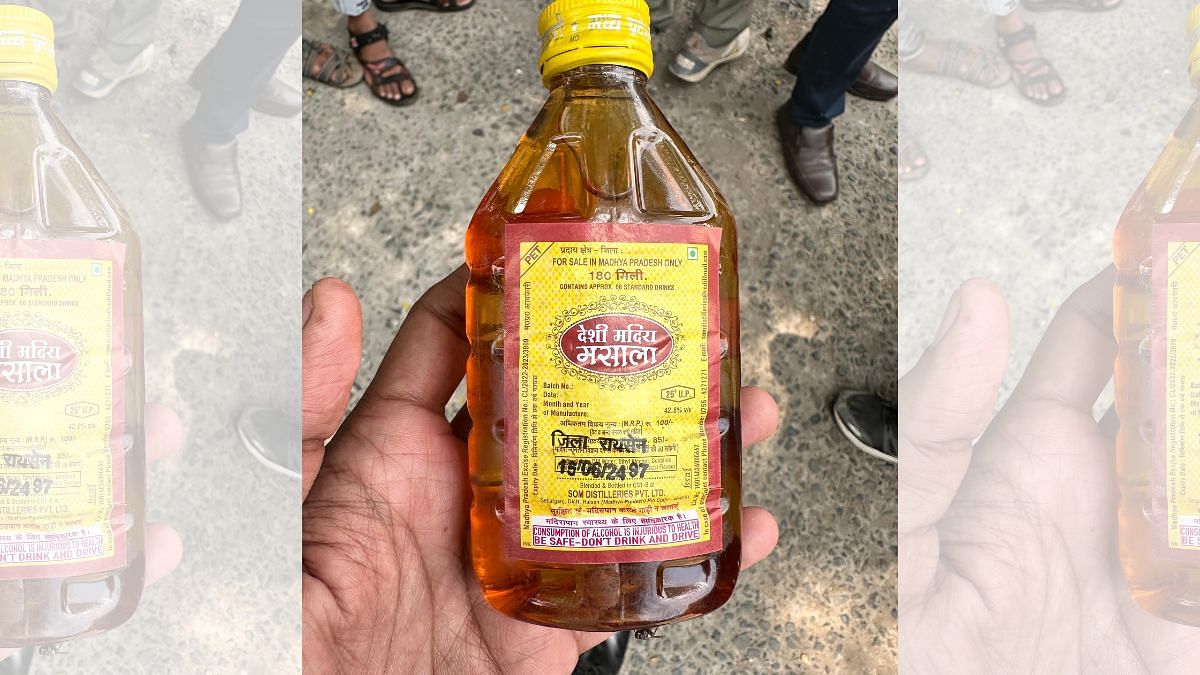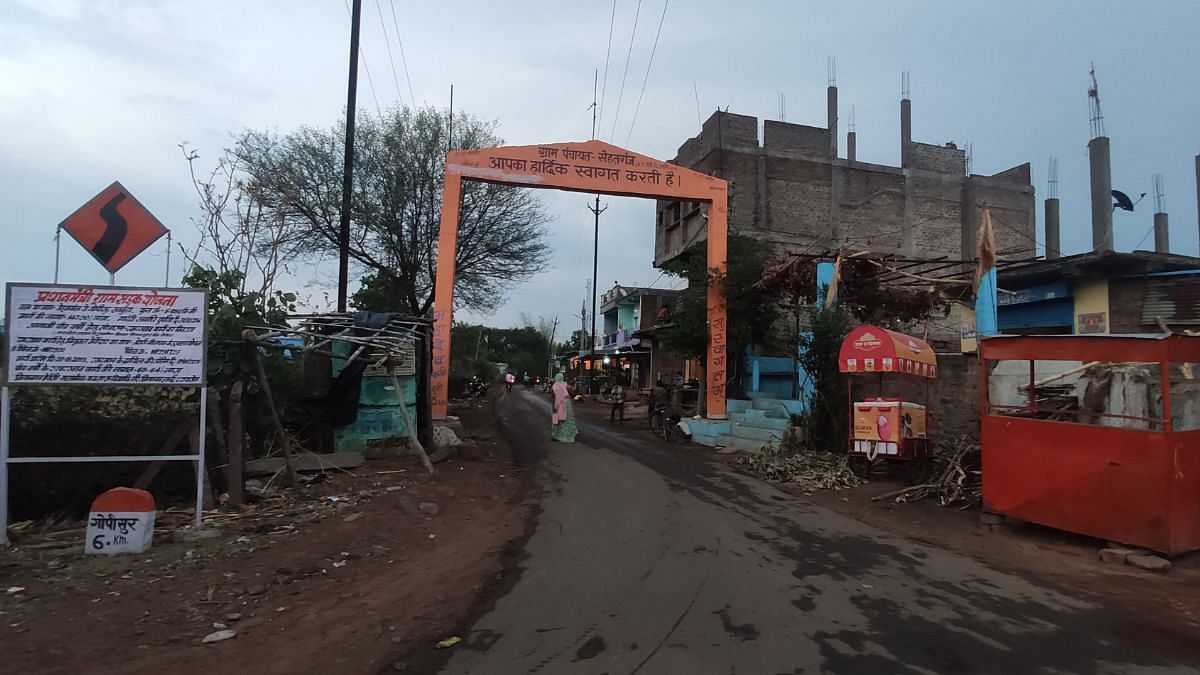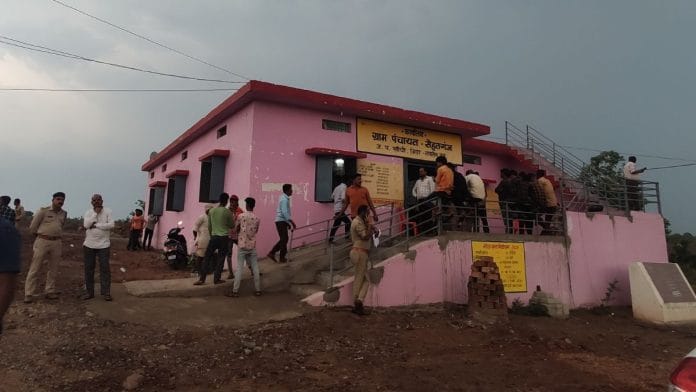Raisen: Sitting cross-legged on the dirty tiled floor of the panchayat bhawan in Sehatganj, a village on the border of Bhopal and Raisen districts in Madhya Pradesh, 39 boys rescued from Som Distillery a day earlier huddle together, eating food from thermocol plates. A team of district officials — including the collector, representatives from the Child Welfare Commission (CWC), and police personnel — are busy recording statements, conducting medical tests, and verifying the children’s documents.
Outside the freshly painted panchayat building, their parents flock near the entrance, peeping into the room, hoping to catch a glimpse of their children, while police personnel call out names, asking for documents like Aadhaar cards and latest marksheets.
This comes a day after Priyank Kanoongo, Chairperson of National Commission for Protection of Child Rights (NCPCR), on 15 June, inspected the premises of Som Distilleries, a liquor factory located on Raisen road falling in Raisen district, after receiving a complaint from Bachpan Bachao Andolan, an India-based children’s rights movement.
Kanoongo and his team found 58 minors — 19 girls and 39 boys — working at the factory and operating the machines used for packaging, labelling, segregating and filling the bottles.
In his letter to the inspector in-charge of Umraoganj police station, Kanoongo stated, “The children were brought to work in the distillery in school buses. By working in the factory, the skin of the children’s hands has melted away.” ThePrint has accessed the letter.
In a post on X, Kanoongo also shared pictures showing the children’s hands with shriveled, white skin.
बेशर्म श्रम विभाग….
शराब फ़ैक्टरी में बच्चों से काम करवाने के मामले में ज़िम्मेदार विभागों में बेशर्मी की होड़ लगी हुई है !!!
महिला अधिकारी को बच्चों की जली हुई चमड़ी नहीं दिखी जो यह नोटिस-नोटिस का खेल खेल रही हैं ?
बच्चों से शराब बनवाना संज्ञेय अपराध है,उन पीड़ितों
मुआवज़ा… pic.twitter.com/zeqBj91WEk
— प्रियंक कानूनगो Priyank Kanoongo (मोदी का परिवार) (@KanoongoPriyank) June 17, 2024
Kanoongo, in his application to the police, urged a case to be registered under sections 75, 77, 78 and 79 of The Juvenile Justice (Care and Protection of Children) Act, 2015, along with section 14 of The Child Labour (Prohibition and Regulation) Act, 1986, section 16 of The Bonded Labour System (Abolition) Act, 1976, relevant sections of the Scheduled Caste and Scheduled Tribe (Prevention of Atrocities) Act, 1989, and section 370 for prevention of human trafficking of the Indian Penal Code (IPC).
Speaking to ThePrint on condition of anonymity, a child rights activist pointed out that NCPCR has its own guidelines for a pre- and post-rescue plan, to ensure that the rescued child does not end up being treated like a criminal.
“There are duties assigned to ensure appropriate food and shelter for the rescued child. But was it done? What ends up happening is that the child becomes entangled in bureaucratic procedures while their parents run from pillar to post to prove a hundred things, instead of the responsibility falling on their employers, in this case the Som factory owners,” the activist said.
The activist added that although employment of children in hazardous factories, that include distilleries and alcohol factories is prohibited under The Child and Adolescents Labour (Prohibition & Regulation) Act, 1986, the penalty faced by employers is Rs 20,000 to Rs 50,000. “When it comes to a factory like Som, which is so well established, these penalties mean nothing,” he said.
A 16-year-old boy, who has completed his class 6 education, had been working at Som Distillery for just one week, sticking labels. He had no idea why the police were there or if he had done something wrong. “Pata nahi kyun laya hai.. shayad hath dekhne ke liye, ki wo chemical se kharab toh nahi hue hai,” he said, showing both his hands, as if to gesture that they were in perfect condition.

The boy, from Gopi Sur village, located 6 km from the factory, learned about the job during one of his visits to Shamshabad, which lies across the road from the distillery.
“I was told I would be paid Rs 300 per day, and I wanted to earn some money for myself. But I haven’t been paid yet, and now they’ve brought us here,” he said as he stepped out of the panchayat bhawan to fill water from a cooler.
His father told ThePrint, “We didn’t know he was going to the factory. I just hope they let us go home soon. Once the sun sets, there is tiger movement in the area. If they want, we can come back tomorrow.”
Standing next to the father was another 16-year-old who had been packaging bottles at the factory for the past month, earning Rs 300 per day. “I was making Rs 1,800 per week and gave the money to my parents after keeping some for myself. They asked me to save some of it to buy a new school uniform for when school starts,” he said.
On Sunday, a team from the district administration inspected, medically examined, and recorded the statements of 39 boys. This followed the recording of statements from 19 girls the previous day.
As the medical team drew blood from one of the boys, his father requested they not take too much blood, fearing it would weaken his child.
When the doctors sharply questioned why he had sent his child to work at an alcohol factory if he was so concerned about his son’s health, Nayak said, “Sahab, bhejenge nahi to pait kaise bharenge” (Sir, if we don’t send them, how will we fill our stomachs?).
Som Distilleries is one of the largest groups in the alcoholic beverages industry in central India and is led by its Chairman and Managing Director, Jagdish Kumar Arora, who hails from Ashok Nagar in Madhya Pradesh. Originally founded as a distribution house in 1980, Som Distilleries has since evolved into a prominent alcobrew manufacturing enterprise and exports to over 25 countries, including the US, New Zealand, Germany, and Finland.
ThePrint reached G.D. Arora, Director at Som, via calls and messages. This report will be updated if and when a response is received.
Also read: Malls, restaurants, markets set to open 24/7 in Madhya Pradesh in bid to boost economic growth
‘Never had any problems’
For those from adjoining villages of Shamshabad, Gopi Sur, and Nayapura, working at Som Distillery near Sehatganj was a reliable way to earn a livelihood. Many had been working there for years, but they now feel things will change after the inspection and subsequent actions.
Ajay Nayak, a mason by profession watching the hubbub from a tea stall near the panchayat bhawan, said that several people from Sehatganj have been working at the distillery. “They have never had any problems with their hands or legs. But I feel people will be more hesitant now after this action,” he said.
Outside the panchayat bhawan, 24-year-old Sanjay Gorelal told ThePrint that he has been working at the factory for the past four years. He had attended the government school up to class 8 and then completed his class 9 education at the school run by Som factory. After briefly trying his hand at masonry, Gorelal had switched to working at the factory.
Sanjay now works as a machine operator, earning Rs 500 a day. Along with him, 10 other members of his extended family also work at the factory, performing various tasks such as filling liquor bottles, sticking labels, and packaging.
For Gorelal, the factory job has provided a steady income, allowing him to earn up to Rs 10,000 per month.
“There is no other work available here. No government schemes give us work, only women have started getting Rs 1,250 since the past year, but that is not enough,” he said.
He explains that the pictures of children’s hands with shriveled skin is misleading.
“I have been working for four years, nothing has happened to my hand. When anyone spends some time working in water, their skin shrivels, but an hour later, it is back to normal,” he added.
Even before Gorelal finishes his sentence, Kamal Nayak, who has been working at Som Distillery for over a decade, said, “After all this police action is over, and everyone is gone, our families will not even have the one source of employment that they presently do at the factory.”
He added, “When you hold a bottle to fill the liquor, some of it spills. If you do it for long hours, the skin of your hands turn white, but it is temporary.”

As the villagers stand outside the gate of the panchayat bhawan waiting for the police to finish their investigation, police personnel call out to Hari Singh asking him to submit his son’s marksheet.
When ThePrint asked Hari Singh if he knew that his son worked at the distillery, Singh said: “Yes, he went there to earn some pocket money for himself.”
According to District Collector of Raisen, Arvind Kumar Dubey, “Medical examination of children is underway, but on prima facie inspection, the children examined so far have not shown signs of chemical burns on their hands. We are still investigating thoroughly and the Child Welfare Commission (CWC) is taking the necessary action.”
The district administration Sunday suspended labour inspector for the area, Rajendra Shrivastava. This comes a day after Chief Minister Mohan Yadav took cognisance of the situation and ordered the suspension of District Excise Officer and three sub-inspectors.
The district administration has issued a show cause notice to Som Distilleries.
The factory was inspected Sunday by the Deputy Director of Industrial Health and Safety and further action against the factory owners will be taken as per their finding, explained another official.
Also read: 7 women lured using ‘Magic App’ & raped — police in MP’s Sidhi uncover racket, arrest 4






